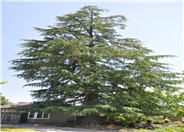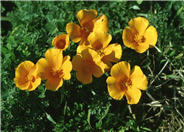
Common name:Deodar Cedar
Botanical name:Cedrus deodara
This fast-growing, coniferous evergreen is capable of reaching a size of 80' high by 40' wide. Its needles are a light, silvery green color, 2" long. Flowers are inconspicuous. Barrel shaped cones appear in fall and winter. Branches are pendulous and spreadings. Plant in area that has ample room for growth.

Common name:Flanders Poppy
Botanical name:Papaver rhoeas
This beautiful annual has bright red single flowers, each petal often marked at its base with a large black blotch. Sow seeds in spring. Flanders Poppy is attractive near entries, walkways, and in containers. It can reach 3' tall and prefers full sun in well draining, rich soil. It may re-sow.

Common name:Sweet Alyssum
Botanical name:Lobularia maritima
Lobularia maritima is an annual. It is a low branching, trailing plant to 1' tall, with narrow or lance-shaped leaves .5"-2" long. There are tiny, four-petaled, white flowers crowded in clusters.

Common name:California Poppy, Golden Poppy
Botanical name:Eschscholzia californica
This small annual (sometimes acts as a perennial) plant will grow to less than 1' tall and has light, small blue green leaves with gold and orange flowers that bloom in spring and summer.

Common name:Catmint
Botanical name:Nepeta X faassenii
Nepeta faassenii makes soft, grey-green, undulating mounds to 1.5' high in bloom, spreading 3'-4' wide. The small leaves are attractive to cats. This perennial has lavender blue flowers in summer. Catmint can be planted in sun or shade and needs medium amount of water. Prune spent flowers to encourage more blooms.

Common name:Powis Castle Artemisia
Botanical name:Artemisia 'Powis Castle'
This mounding shrub reaches 3 ft. high and up to 5ft. wide with fine silver foliage. It does well in coastal areas as well as inland warm areas. It rarely blooms but is used for its beautiful foliage. It is striking next to perennials with bright colors. This shrub prefers full sun and well draining soil. It is drought tolerant once it's established.

Common name:Eulalia Grass, Japanese Silver Gras
Botanical name:Miscanthus sinensis
Miscanthus sinensis is popular ornamental grass. Red flowers are held well above foliage clumps, appearing in summer, and may be cut for fresh or dry arrangements. Miscanthus needs full sun and watering at least once a week and more during hot summers. Foliage is variegated, with a thin white band down the center. This grass does great in coastal as well as warm inland valleys.

Common name:Flamingo Eulalia Grass
Botanical name:Miscanthus sinensis 'Flamingo'
These deciduous grasses grow from 4'-7' tall, and often turn orange or dark red before going dormant. Tall, showy spikes of feathery, curved seed heads are borne and retained well into the winter or the following spring. It should receive sun to part shade, and average to little summer watering. Tall grasses are highly combustible. -Monterey Bay Nursery

Common name:Elijah Blue Fescue
Botanical name:Festuca glauca 'Elijah Blue'
The 'Elijah Blue' is a lovely ground cover grass with silver blue foliage that quickly reaches 12" tall and wide. This evergreen grass has golden flowers that bloom in summer. However, 'Elijah Blue' is grown for its foliage. Plant in full sun in coastal areas; in warm inland areas, it should receive afternoon shade to prevent it from turning brown. It is drought tolerant once it's established. It prefers well draining soil.
Designer: Jody Palmer
Photographer: GardenSoft
Incorporate compost 6" into your soil to retain water, reduce compaction, feed earthworms, and provide valuable nutrients to your plants.
Develop healthy soil for plants that are vigorous and naturally pest-resistant.